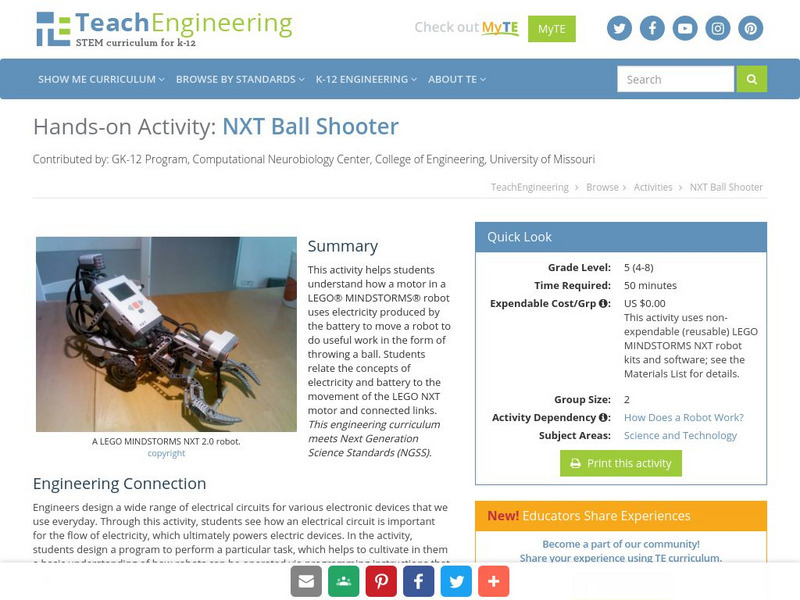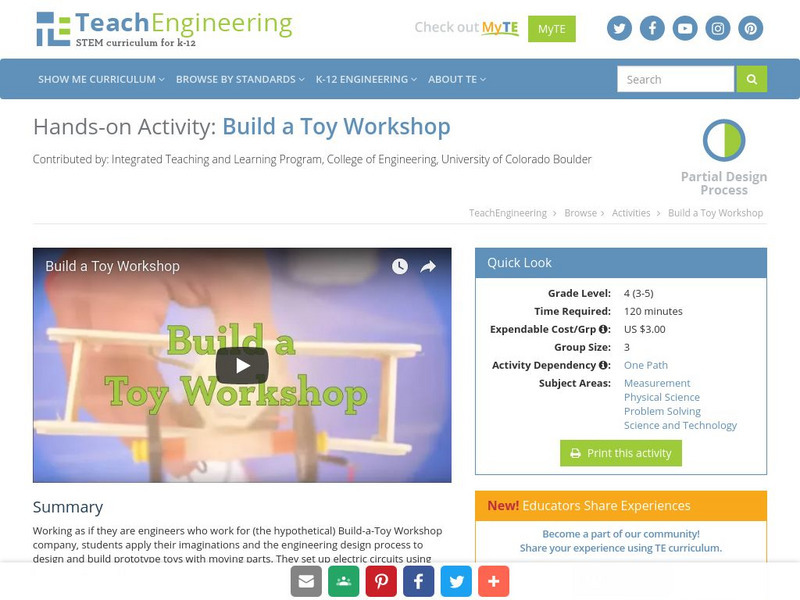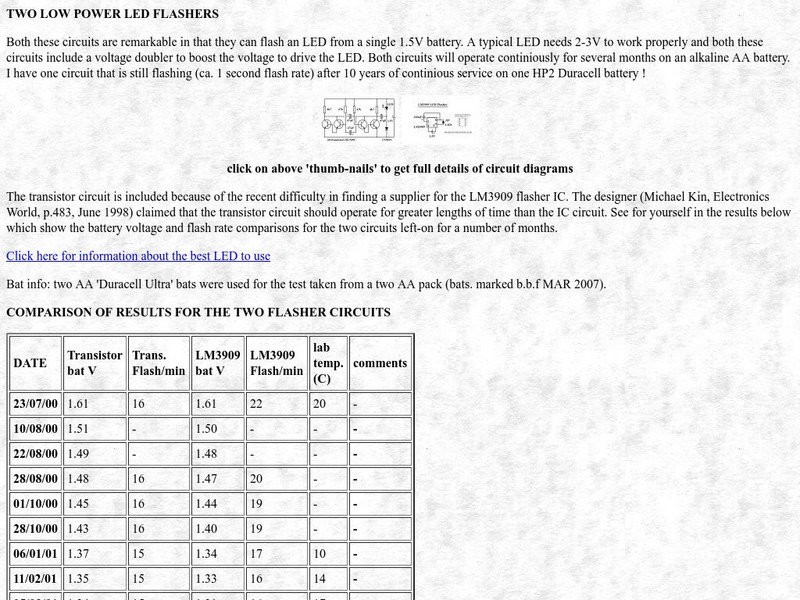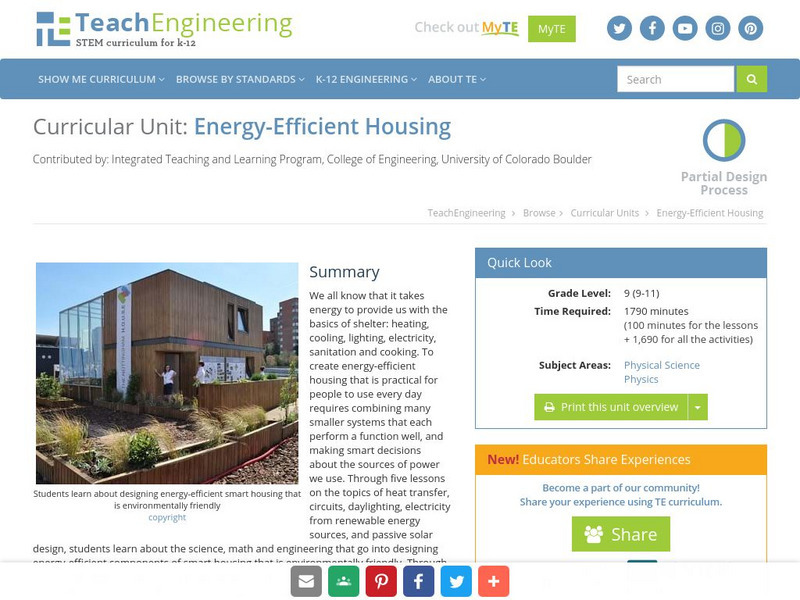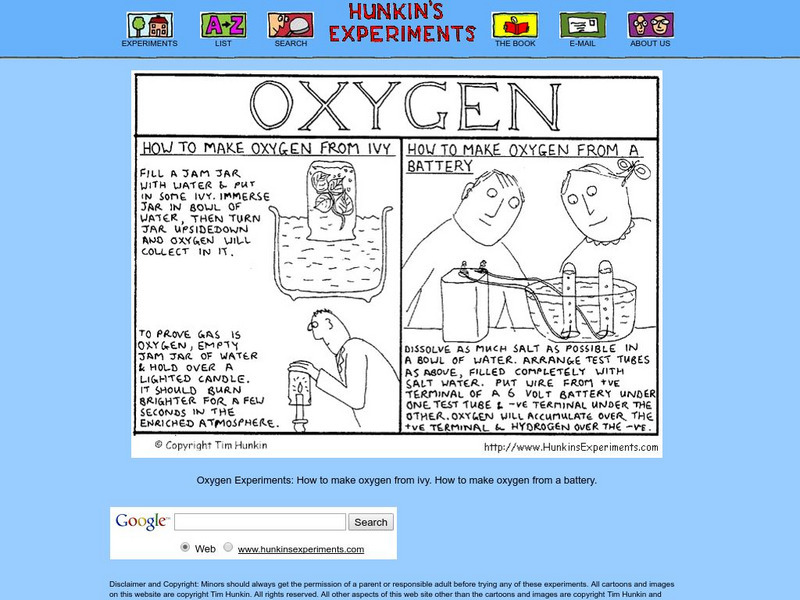Hunkins Experiments
Hunkin's Experiments: Electric Shocks!!
Hunkin's Experiments is a group of simple cartoon illustrations of scientific principles. Some would work well in the classroom, but others have little value beyond entertaining students. All of the projects are easy to do. These...
Alabama Learning Exchange
Alex: Wired for Learning
As part of a unit on electrical circuits, students will work in collaborative groups to create a video of how to construct parallel and series circuits. This lesson plan was created as a result of the Girls Engaged in Math and Science...
TeachEngineering
Teach Engineering: How Does a Robot Work?
This instructional activity introduces electricity, batteries and motors using a LEGO MINDSTORMS NXT robot. The associated activity guides students to build a simple LEGO NXT set-up and see the practical implementation of the concepts...
PBS
Pbs Kids: Design Squad Challenge: Dance Pad Mania (Pdf) [Pdf]
Hands-on challenge to build a dance pad that lets you use your feet to either flash a light or to sound a buzzer. Provides full list of materials with ideas on how to design, build, test, and redesign the pad if necessary. Activity...
TeachEngineering
Teach Engineering: Potato Power
Students use potatoes to light an LED clock (or light bulb) as they learn how a battery works in a simple circuit and how chemical energy changes to electrical energy. As they learn more about electrical energy, they better understand...
TeachEngineering
Teach Engineering: Nxt Ball Shooter
This activity helps students understand how a motor in a LEGO MINDSTORMS NXT robot uses electricity produced by the battery to move a robot to do useful work in the form of throwing a ball. Students relate the concepts of electricity and...
TeachEngineering
Teach Engineering: Pointing at Maximum Power for Pv
Student teams measure voltage and current in order to determine the power output of a photovoltaic (PV) panel. They vary the resistance in a simple circuit connected to the panel to demonstrate the effects on voltage, current, and power...
Science Buddies
Science Buddies: Dance Mania: Build Your Own Dance Pad!
The objective of this electricity and electronics science fair project is to build a dance pad that flashes lights when you step on it.
Science Buddies
Science Buddies: Which Materials Are the Best Conductors?
There are two main types of materials when it comes to electricity, conductors, and insulators. What are they made of? Find out by testing different materials in a circuit to see which ones conduct the most electricity.
Science Buddies
Science Buddies: Solar Cell Power Output vs. Temperature
Solar cells provide a clean way of making electricity directly from sunlight. In this project you will build a simple circuit and experimental setup to investigate whether the power output of a solar cell changes with ambient temperature.
Science Buddies
Science Buddies: Where There Is Charge, There Can Be Sparks!
In this short science project you will learn how to build a capacitor using common household items. By testing different charge cycles, you will work to discover how much charge is stored in a Leyden jar capacitor.
Science Buddies
Science Buddies: Waste Not, Want Not: Use the Microbial Fuel Cell to Create Elec
Gross. What is that in the toilet? But maybe it's not just gross. Did you know there are bacteria that digest organic waste and create electrons? What if there was a way to collect those electrons to power a circuit? In this science fair...
TeachEngineering
Teach Engineering: Build a Toy Workshop
Working as if they are engineers who work for (the hypothetical) Build-a-Toy Workshop company, students apply their imaginations and the engineering design process to design and build prototype toys with moving parts. They set up...
Creative Science Centre
Creative Science Centre: Two Low Power Led Flashers
Explains the design of two circuits that can flash an LED from a single 1.5V battery. A typical LED needs 2-3V to work properly and both these circuits include a voltage doubler to boost the voltage to drive the LED. Both circuits will...
Science and Mathematics Initiative for Learning Enhancement (SMILE)
Smile: Simple Circuitry and Series Circuit
A teacher lesson plan which could be easily converted into an idea for a student project or presentation. This page describes an activity in which the basic nature of a circuit and the concepts of a series circuit are investigated....
Science and Mathematics Initiative for Learning Enhancement (SMILE)
Smile: Resistances in Series and Parallel Circuits
A teacher lesson plan is provided here. This page describes two activities in which the effect of multiple resistors on the current and overall resistance of both series and parallel circuits are investigated. Complete activity...
TeachEngineering
Teach Engineering: Energy Efficient Housing
We all know that it takes energy to provide us with the basics of shelter: heating, cooling, lighting, electricity, sanitation and cooking. To create energy-efficient housing that is practical for people to use every day requires...
Oak Ridge National Laboratory
Ornl: Teacher's Guide Superconductivity for High School Students
This site from the Human Genome Project provides a large collection of facts and information, demonstrations, experiments and project ideas. Written for teachers but easily adaptable for any type of student work. A good site to check out...
TeachEngineering
Teach Engineering: The Power of Food
Students imagine they are stranded on an island and must create the brightest light possible with the meager supplies they have on hand in order to gain the attention of a rescue airplane.
Science and Mathematics Initiative for Learning Enhancement (SMILE)
Smile: Batteries and Bulbs
For the teacher planning a lesson or for the student preparing for a project or presentation. This page describes an activity in which parallel and series circuits are constructed using batteries and bulbs. Complete activity directions...
Science and Mathematics Initiative for Learning Enhancement (SMILE)
Smile: Ohm's Law
For the teacher planning a lesson plan or for the student preparing for a project or presentation. This page describes a series of simple activities related to the voltage-current-resistance relationship.
Hunkins Experiments
Hunkin's Experiments: How to Make Oxygen From a Battery
Hunkin's Experiments is a group of simple cartoon illustrations of scientific principles. Some would work well in the classroom, but others have little value beyond entertaining students. All of the projects are easy to do. This one...
Maryland Science Center
Maryland Science Center: Happy Birthday, Harry Potter! [Pdf]
Using your knowledge of electricity, learn how to make a 'magic' wand like Harry Potter's that will light up on your command.
TeachEngineering
Teach Engineering: Hands on Activity: Designing a Thermostat
By building a basic thermostat, students will explore basic circuitry and electricity. The thermostat built out of a breadboard, temperature sensor chip, amplifier, and battery creates a linear relationship between temperature of the...





![Pbs Kids: Design Squad Challenge: Dance Pad Mania (Pdf) [Pdf] Handout Pbs Kids: Design Squad Challenge: Dance Pad Mania (Pdf) [Pdf] Handout](https://content.lessonplanet.com/knovation/original/39874-4adfadd8b52b66e71cac53cd55883d55.jpg?1661243850)

